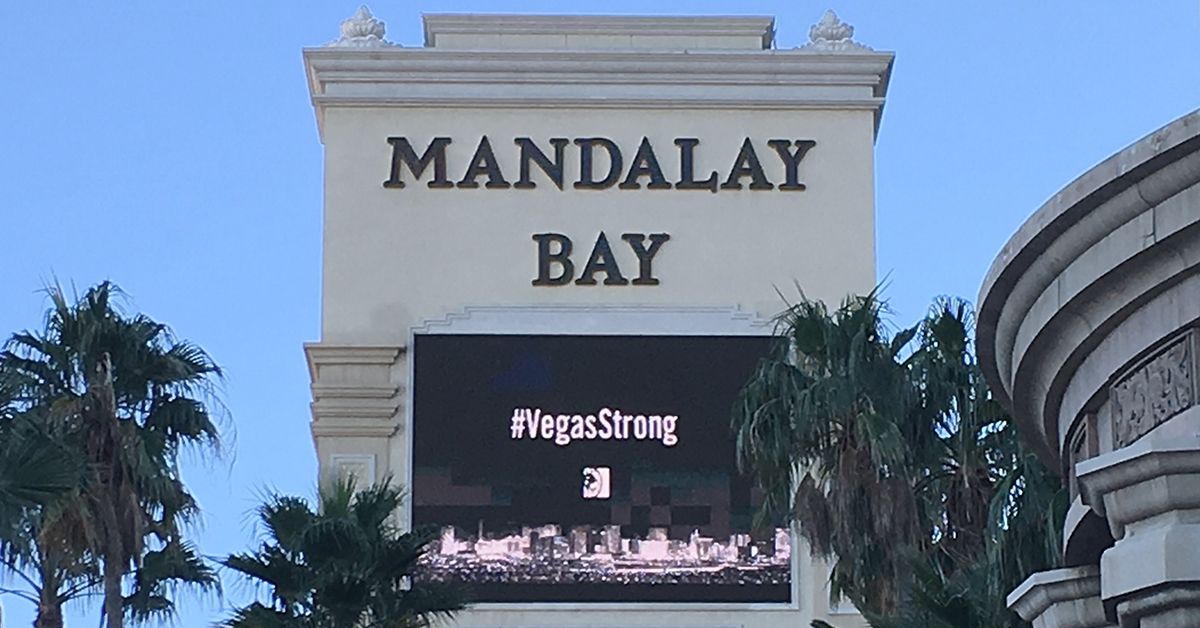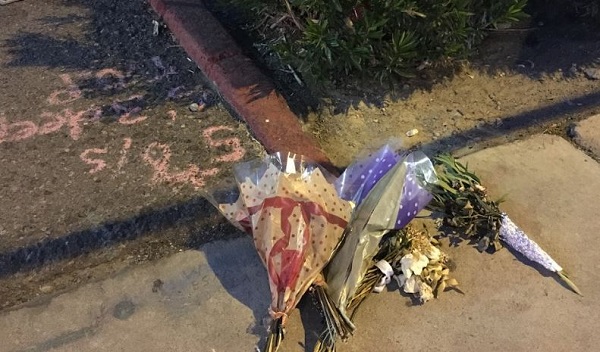A week after a mass shooting turned an outdoor country music festival into the site of a massacre, Las Vegas was a city mourning, and its iconic Strip a crime scene. Before many of the dead were even identified, a now all-too-familiar network of conspiracy peddlers had pounced.
Police say Stephen Paddock, 64, used the 32nd floor of the Mandalay Bay Resort and Casino as a vantage point from which he rained automatic gunfire down on the Route 91 Harvest Festival crowd of 22,000 below. In what would be the worst mass shooting in modern United States history on 1 October 2017, 58 people lost their lives and hundreds more were injured. Hauntingly, when we visited the Strip the following weekend, bouquets still lay around the festival grounds, marking the spots where people had collapsed while trying to flee.
The Las Vegas Metropolitan Police Department, the law enforcement agency leading a contingency of organizations (including the Federal Bureau of Investigation and Bureau of Alcohol, Tobacco, Firearms and Explosives) on the investigation, has reiterated on multiple occasions that they have no evidence suggesting there was a second shooter during the killing spree. Nevertheless, a week after the shooting, the conspiracy theory had gained such prominence that the majority of people we approached had doubts about law enforcement's investigative findings. An LVMPD spokesman told us:
I think it’s fair to say the investigation began immediately after the incident occurred — we had officers on scene and after a sweep of the hotel there was no indication there was another person shooting from another room. There was no indication there was another shooter inside the room either. We’re not into rumors we are into facts, and although we are taking all tips, we have to vet that information and pursue the most credible information.
Las Vegas resident Alexis Axelrod, 39, said she thinks much of the rumor is coming from people frustrated by a lack of answers in an investigation that has, so far, produced no discernible motive for the shooting. Standing by a cluster of votive candles and flowers near the entrance of Mandalay Bay, she told us:
People don't have answers and they're just looking to fill the blank. It's easier to say "terrorism" than the guy was crazy, or we simply just don't know why he did it.
I would say [the police] are doing an excellent job. Obviously they can't tell us everything at once because it's an active, open case but I'm sure there will be more information forthcoming as time goes on.
However, there was no shortage of false information in the immediate aftermath, produced cheaply and quickly and disseminated instantly and widely. Internet users on the message board 4chan quickly identified the wrong man as the shooter, resulting in that man receiving death threats. Career conspiracy theorist Alex Jones weighed in with the "false flag" narrative that the shooter was a "patsy" and the attack would be used as pretense "to kick off the left's war with the right." YourNewsWire.com latched on with rapid-fire stories, two of which claimed they had video "confirmation" that there had been multiple gunmen (both videos have already been debunked.) Sandy Hook "truthers", meanwhile, began looking for evidence that the Las Vegas victims and their relatives were "crisis actors" in yet another staged mass shooting.
Minutes before we spoke to Axelrod, we encountered a young man in front of the Mandalay Bay hotel who explained his take on the shooting. There was more than one shooter, and the government is covering it up, he told us. Why? Alluding to a related conspiracy theory about the United Nations Small Arms Treaty, he said this was yet another gun-related catastrophe engineered by the United States government in service of the New World Order, a ubiquitous conspiracy theory (which has anti-Semitic roots) that posits a powerful cabal is angling to take Americans' guns away in order to seize control and establish an autocratic global government.
Earlier that day, a Las Vegas resident we spoke to expressed doubts about law enforcement's findings, not because she was invested in a specific conspiracy theory but because the false narrative had simply saturated the Internet to the point she kept encountering it. When we asked where she got her information, she pulled out her phone and opened Facebook, scrolling to a debunked YourNewsWire story with the headline: "Las Vegas: Video Footage Confirms Multiple Shooters, Co-ordinated Attack." The story has been shared hundreds of thousands of times. She also pointed out a link to Alex Jones's InfoWars, noting she didn't know who he was.
Kathryn Olmsted, history professor at University of California at Davis and an author and expert on conspiracy theories, told us the faster news travels, the faster false information travels as well:
You see that again and again throughout history, particularity since the early 20th century, with news traveling so quickly. A lot of people, when they hear about a traumatic event, want to understand it. It can be somehow more reassuring to believe there is an evil group of people in charge rather than no one is in charge, and what happened was totally random. Psychologists would argue there’s a certain psychological function served by claiming it wasn’t just a random act, but in fact the Las Vegas attack was part of a big plan.
It’s really terrifying to live in a world where that sort of thing just happens, and so people try and come up with theories that explain them. All of the recent horrific mass shootings have been accused of being false flags by the far right conspiracy theorists — [InfoWars host] Alex Jones has made a career out of this now.
To me it seems quite obvious that the Internet and particularly social media is driving the increase in these theories. Now you don’t have the gate keepers any more, and people are able to share these stories directly with their friends on Facebook.
(A "false flag" is conspiracy slang for a disaster engineered by the government with the goal of achieving greater surveillance or security powers. It is an extremely popular explanation for mass shootings, resulting in widespread harassment of victims or their loved ones.)
Marilyn Mayo, senior research fellow for the Anti-Defamation League's Center on Extremism, told us the conspiracy theories after Las Vegas have been exacerbated by the fact that unlike previous mass shootings, no obvious explanation has been presented:
Because of the way it was carried out, where we don't yet know of any specific ties to any particular group or ideology even, there's this sense that people can fill in the gap by coming up with their own theories.
I think what happens for these people who create conspiracy theories is they actually believe them but they don’t think about the consequences of what they’re saying.
The conspiracy theory about the second shooter or multiple shooters partially came from civilians listening to law enforcement radio traffic and taking what they heard at face value — many people we interviewed had been listening to their scanners and said they heard police discussing other possible active shooters. This, they believed, was evidence that Paddock was not alone in his actions that night.
But that is a mistaken assumption, said Bill Flores, a retired assistant sheriff with the San Diego County Sheriff’s Department. It's not unusual, in the panic of an unfolding deadly situation, for the public to call in reports of what they see and hear, and dispatchers have to relay those. Then the officers on scene have to determine whether it's true or not:
In this type of situation where the active shooter is still shooting when the officers arrive, not only do the officers have to consider the possibility of s second shooter but they also have to take care of their own safety as well as the safety of others around them. There’s a whole lot of things that a responding officer has to weigh and consider. They also have an active investigation going on right now even thought the perpetrator's dead.
It's clear in the radio traffic and body camera footage that arriving officers were at first both unaware of where the shooting was coming from, but also were unsure how many attackers there were. During an interview with the CBS news program "60 Minutes," Las Vegas Metropolitan Police Sgt. Joshua Bitsko, who along with three others formed an impromptu strike team to take on the shooter, said:
We're told that security is taking fire from a suspect on the 29th floor. And that we had other officers that were identifying the suspect was in a room on the 32nd floor. So we're thinking multiple shooters at this point.
When police initially arrived, they thought there was a shooter was inside the festival grounds, and at another point they thought shots were coming from one of the gates. Later an officer says she couldn't tell if the shots were coming from Mandalay Bay or the neighboring Luxor hotel. It's clear they were dealing with multiple gunshot victims, coordinating medical aid and trying to shut down streets around the area to prevent further casualties. At one point, an officer informs dispatch:
We're making tourniquets out of blankets but I'm running out of blankets here.
Within minutes, however, an officer radioed that he was on the 31st floor and heard gunfire coming from the floor above. Later, they identified the room the shooter was in: Room 135 on floor 32. When they breached the door they found only Paddock's body inside.
Tricia Garelts, the wife of an LVMPD officer and member of Police Wives of America, was standing near a large memorial of 58 crosses, balloons and flowers near the iconic "Welcome to Las Vegas" sign when we interviewed her, handing out water bottles and wearing a T-shirt that read "Overcome Evil."
She told us it was a mistake to interpret radio traffic as evidence for multiple shooters, because the night was deadly chaos; people were running for their lives and first responders were working against time to stop the shooting and get the wounded to hospitals:
I truly believe if I was a citizen out there and heard different random noises in that situation, it would be easily to perceive that some other situation [than what was actually happening] was going on.
The misinformation being spread, she said, is only causing more fear and anxiety. Of the conspiracy peddlers, she said angrily:
Where were they when [first responders] were out there saving lives? They weren't out there.
Although it may be too early to say whether loved ones of Las Vegas victims will be harassed to the extent that the families of victims in the 2012 Sandy Hook Elementary School shooting have been, Ryan Graney, who represents the family of Victoria Soto — a teacher who died trying to protect her students — said five years later, Internet characters are still on a crusade to prove Soto was not really murdered and the shooting was a "false flag":
I don’t know what's missing in their brains, like the empathy center maybe. They think they're so right, and the government is so out to get them that it’s OK for them to harass these families.
I'm tired of dealing with these people, but I have to — I help the Sotos, but other families don’t have that barrier, and the moms and dads have to read these comments.
These people sit around on their computers and trash talk [victims and their families] and come up with their batshit crazy theories. And they think they’re right.


